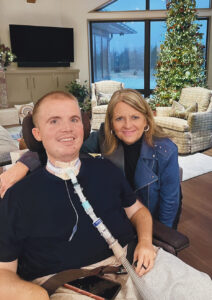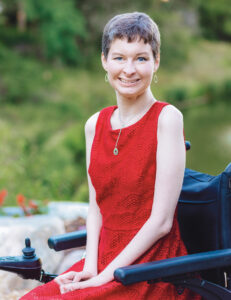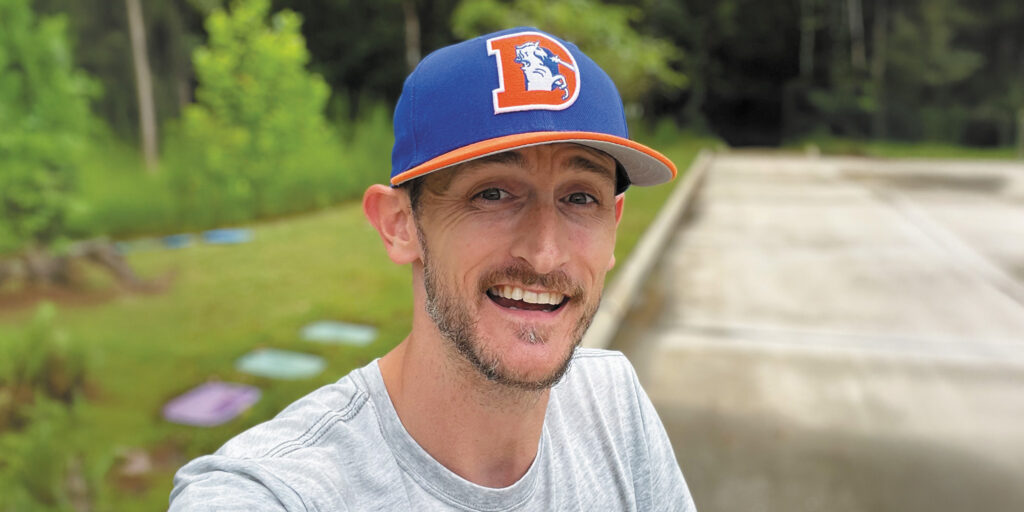
Raising Resilient Kids with Neuromuscular Diseases
By Karen Doss Bowman | Monday, February 12, 2024
5 Second Summary
Parenting a child with a disability demands the same qualities we want to instill in our kids — honesty, resilience, and courage. People living with neuromuscular diseases share how their upbringings helped them build confidence and thrive.
From the time Alexa Dectis was diagnosed with spinal muscular atrophy (SMA) at 18 months old, her parents spoke openly and honestly about her condition and how it would affect her body.

Alexa Dectis is a lawyer in Los Angeles.
They never tried to hide the fact that SMA is progressive and would weaken her muscles over time. And every time her mother performed a task such as cough assist, she carefully explained to Alexa what she was doing and why.
Now 30 years old, Alexa is thriving and living on her own in Los Angeles – 3,000 miles from her parents in Orefield, Pennsylvania. An entertainment lawyer, she credits her parents’ candid conversations about her condition as a factor driving her independence and success.
“Nothing about my diagnosis was ever kept from me,” says Alexa, who has been listed in Forbes “30 under 30” list. “My parents’ openness made all the difference in the world. Their willingness to have conversations about the severity of my physical limitations motivated me to make the most of every opportunity that I possibly could.”
Generally, parents strive to raise their children to live as independently and productively as they can. That can be especially daunting for parents whose children have physical limitations. But kids with neuromuscular diseases can and do grow up to lead fulfilling lives with those limitations. As Alexa’s experience shows, talking openly with children about their disease is the first step to normalizing the experience and reducing anxiety.
Parents play a key role in building a foundation to encourage their children to dream big. Here are some tips for boosting their confidence to go out and pursue those dreams.
Provide opportunities to make friends

Brock Dahlke, pictured with his mom, appreciated having freedom as a teen.
Make sure children with neuromuscular conditions have opportunities to engage in various social settings such as school, church, and community organizations. That will help them form friendships and develop critical interpersonal skills.
After Brock Dahlke was diagnosed with Duchenne muscular dystrophy (DMD) at 6 years old, his parents always welcomed his cousins and friends into their home in Shakopee, Minnesota. This created a community of support to help meet Brock’s physical and social needs. When Brock was a teenager, his parents even occasionally gave his friends the keys to the family’s wheelchair-accessible van. That allowed Brock to spend time with his friends without his parents around, going to movies, sporting events, restaurants, and other adventures.
“My parents wanted me to go out and do things with my friends, but it was a huge step for them to allow my friends to drive me around; not a lot of parents would do that,” says Brock, now 32 years old. “Being able to spend time with my friends and go out like other teenagers helped me have a more normal social life.”
Related Resources
Peer Connections brings people in the MDA community together, whether they’re in the same neighborhood or across the country. Participants can specify that they are open to being connected to others based on criteria including diagnosis, age, and interests. To get started on a match, reach out to the MDA Resource Center at 833-ASK-MDA1 or ResourceCenter@mdausa.org.
MDA Let’s Play provides a welcoming environment for everyone in the MDA community to enjoy gaming and activities while socializing with others who can truly understand their unique situations. Join events like Saturday Game Night or check out daily streamed content.
Promote advocacy skills

Areti Vassilopoulos, PhD
Encourage and empower children to advocate for themselves. Give them opportunities to ask questions at each medical appointment, and include them in school meetings for their individualized
education plan (IEP) or 504 plan. This will teach them to speak up about their needs and wants. But don’t get frustrated or give up if this lesson takes a long time.
“The advocacy piece is a long road, and it takes practice and feedback,” says Areti Vassilopoulos, PhD, pediatric health psychologist and assistant professor of clinical pediatrics and child psychology at Yale School of Medicine.

Ann Motl learned to advocate for herself by watching her mother.
Ann Motl, a 33-year-old lawyer living with Charcot-Marie-Tooth disease (CMT), learned self-advocacy techniques by observing her mother’s persistent requests for appropriate and reasonable accommodations at school. When Ann was in high school, for example, one of her classes was on the second floor — accessible via an unreliable elevator that had to be operated by a school official. Her teacher resisted moving to a first-floor classroom even though Ann was often late or missed class because of elevator problems. Her mother pushed back.
“My mother persuaded school officials that this was ridiculous, and the teacher finally moved the class downstairs,” recalls Ann, who grew up on a dairy farm in Staples, Minnesota. “Situations like this were a learning process for both my mom and me. I was able to see her advocacy style and learn strategies for taking care of myself once I was in college and living on my own.”
Related Resources
MDA Ambassadors help raise awareness about neuromuscular diseases by sharing their compelling stories at events, online, and through Quest Media. They also gain valuable experience speaking and building connections in the MDA community. Learn about the current MDA Ambassadors and how to apply for the program.
MDA Advocacy volunteers urge legislators to craft public policies that empower the neuromuscular disease and disability communities. This may involve emailing lawmakers, meeting with members of Congress, and more. Learn about MDA’s latest initiatives and sign up to be an advocate.
Encourage self-reliance
Like their peers, children with neuromuscular diseases desire greater independence as they mature. At the same time, the progressive nature of their conditions increases their need for caregiving support. This can lead to frustration and low self-esteem.

Adriana Ferri
Parents can help kids satisfy their desire for independence by encouraging them to participate in decisions related to their care while giving them opportunities to express their needs to caregivers, teachers, healthcare providers, and others.
“It is essential to grow and cherish children’s independence while normalizing seeking and accepting help from others,” says Adriana Ferri, a child life specialist at Texas Children’s Hospital. “Parents should offer praise for doing things independently while also encouraging children to be brave and aware enough to seek support when needed.”
For Ann, attending MDA Summer Camp for 11 years starting at age 7 offered the chance to learn and practice self-reliance.
“Summer Camp was a really great experience for learning to have someone else take care of you,” she says. “During those weeks, you work with an assistant who’s there to help you, and you need to explain what you need from them. That was important for preparing me to go to college and eventually live on my own.”
Related Resource
MDA Summer Camp is a weeklong overnight camp especially for kids with neuromuscular diseases. In a safe and supportive environment, kids build self-reliance and confidence while trying new activities and developing friendships that last a lifetime.
Nurture problem-solving skills
Helping children with neuromuscular diseases to identify their interests and set goals can build confidence. While physical limitations may require these kids to do things differently than others, parents can nurture their problem-solving skills to adjust to challenges.

Sydney Horak is a student at Texas A&M.
“It is important to encourage children, teens, and young adults with neuromuscular diseases that it is okay to have dreams and goals, and we can work together to find ways to accomplish them,” Adriana says.
Sydney Horak, a junior honors student at Texas A&M University, says her parents never limited her choices about what she could or could not do as she was growing up with SMA.
“Where there was a will, there was a way,” says Sydney, an accounting major who aspires to become an entrepreneur after graduating. “My parents wanted me to be able to do everything I wanted to do, even if a little alteration was necessary. I believe this is the primary reason I am so determined and motivated to accomplish my goals. It’s also why I created my own saying: ‘Never let your limitations be your limit.’”
Related Resource
MDA Mentorship Programs help teens and young adults living with neuromuscular diseases discover their strengths and interests and explore career paths. There is no cost to participate in these five-week virtual programs for ages 14-21. Learn how to apply.
Karen Doss Bowman is a freelance writer and editor living with a slow-progressing type of amyotrophic lateral sclerosis (ALS) in Bridgewater, Virginia.
A Model of Resilience
Resilience, the ability to work through and bounce back from challenges, is a skill children can develop over time as they build problem-solving skills and confidence. The best way to teach that skill is to model it. Here are some strategies:
Talk openly about emotions. Be the safe place where a child can ask questions about their disease and share their feelings about how it affects their lives. It’s OK to voice your frustrations and fears, too, but also express confidence in their ability to adapt and thrive.
Demonstrate coping skills. Consider what your child is learning from the way you handle challenges. Can you take a deep breath and remain calm? Are you willing to ask for help when you need it?
Embrace mistakes. When kids are afraid to fail, they avoid trying new things. Give your child the message that mistakes help them learn. You can help by talking about a mistake you made and how you recovered from it.
Make time for self-care. It’s harder to be resilient when you’re running on empty. Follow self-care practices such as meditation, exercise, social activity, and rest. Don’t neglect your mental health. Not only does taking time for yourself help you recharge, but it gives your child some time to practice being independent.
Next Steps and Useful Resources
- Read more about living independently with a disability.
- Listen to a Quest Podcast conversation with Megan DeJarnett, a speaker and inclusion advocate living with spinal muscular atrophy (SMA), about why she wrote her first children’s book, “No Such Thing as Normal.”
- The day her daughter left for college wasn’t the first time Linda VanVliet practiced letting her go. Read how Linda helped her daughter prepare to be independent.
- Stay up-to-date on Quest content! Subscribe to Quest Magazine and Newsletter.
Disclaimer: No content on this site should ever be used as a substitute for direct medical advice from your doctor or other qualified clinician.




